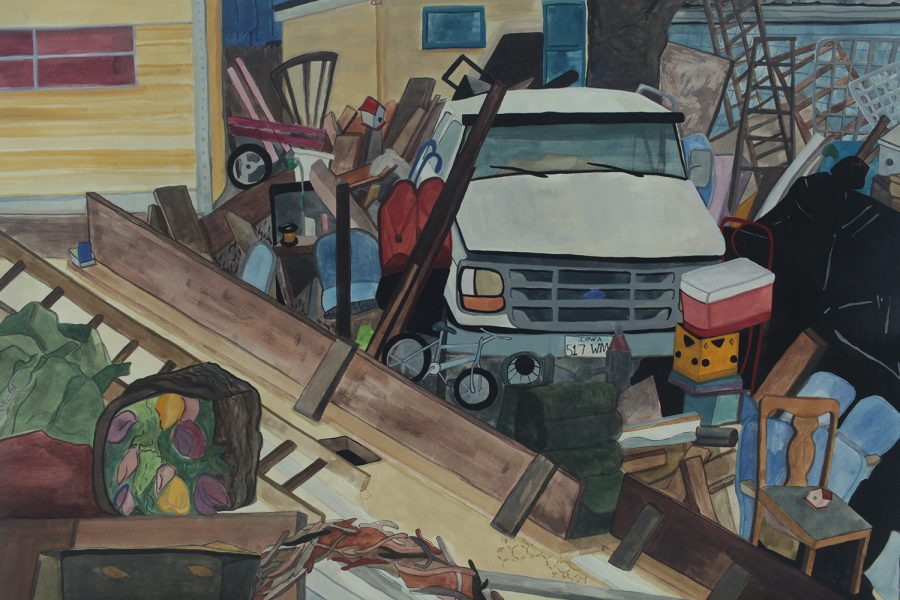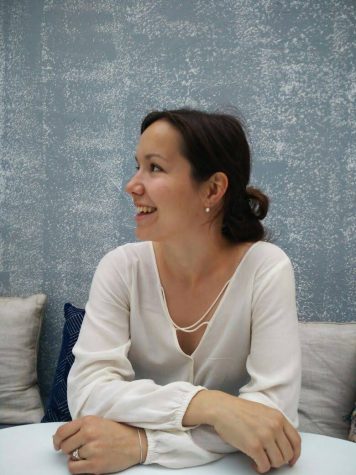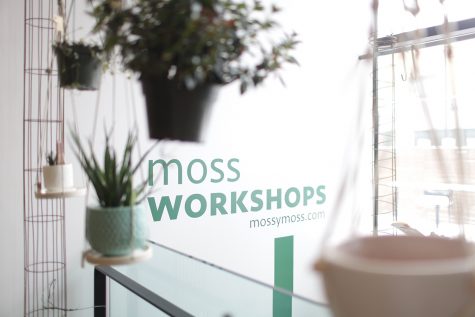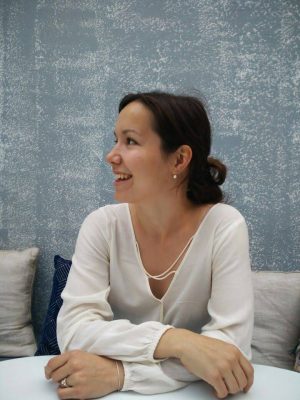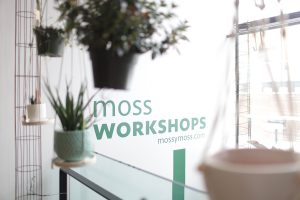UI artist explores the hereditary nature of mental illness
UI senior Katlynne Hummell’s art installation “They fill you with the faults they had” explores family mental illness.
A painting is seen at the “They fill you with the faults they had” Installation by Katlynne Hummell, BFA Exhibition School of Art and Art History in the Visual Arts Building on February 13, 2019.
February 13, 2019
A collection of art hangs in a staggered row on the wall, the pieces crowded with color and objects that one might expect to find in a junkyard.
But to Katlynne Hummell, a University of Iowa senior pursuing a B.F.A. in painting, these photos depict a much more specific story: the personal story of what it is like to live in a family with hereditary mental illness.
“I draw found objects,” Hummell said. “All of the objects my father has accumulated have been found from the trash. That’s why I wanted to use some photos from the past. A lot of my works are still lifes from my home because my parents are hoarders.”
Many of her pieces show the crowded spaces that she sees when she’s home. One in particular depicts a white vehicle trapped in a driveway by various objects, unorganized into one formidable mass.
“Representation of a space that I cannot fit in shows a car and crowded driveway,” Hummell said. “I see it both as a still-life and a family portrait, because when I look at it, I see toys from my childhood, the truck my parents drove, my mom’s camper. But I also see that the places I’ve dwelt upon have been filled with objects. When I was young, there were still things there, but I [had space to] play in the backyard. But since I’ve moved out, the mess in the house has spilled out and engulfed the entire structure.”
RELATED: Non-binary author Sandy Allen sparks conversation on mental health
The pieces are not just images of accumulated trash. Some include tender moments between family members, sometimes placed in these spaces.
“I have a piece called I am not the child my father raised, but he is the father who raised her, which is about familial love,” Hummell said. “It’s a portrait of my brothers and I when I was an infant. I have had similar experiences with mental illness as my siblings. [That’s why] these paintings involve mental illness and the fact that it’s hereditary. My grandfather had it, my father had it, I see it in my brothers and in their kids. I see it in myself.”
Representation of a space that I cannot fit in shows a car and crowded driveway. I see it both as a still life and a family portrait, because when I look at it, I see toys from my childhood, the truck my parents drove, my mom’s camper.
By working on these pieces, Hummell has had an opportunity to reflect on her art process and her own desire to declutter the places she depicts.
“At the start, I was making these gouache paintings with a white border around them,” Hummell said. “Even though these objects had been found outside, I would take out the rust and leaves and dirt [in my paintings], and realized later that I was trying to organize it. I’ve stepped away from this and realized that I need to show the truth rather than organize it.”
By avoiding the very human urge to declutter, Hummell invites the audience to feel the discomfort of crowded spaces.
“I want the paintings to be overwhelming,” Hummell said. “I want you to have that sense of anxiety that I feel. I try to fill the canvas or the paper entirely with bright colors and lots of objects. Some of them will have a board going straight through the image. I want you to feel like you’re falling into it or it’s falling onto you.”
While purposefully uncomfortable to view, Hummell’s pieces explore important themes involving the stigma surrounding mental health.
“It’s important to talk about mental health, because even though it’s so common, there’s a stigma to it, and there shouldn’t be,” Hummell said. “Most people have something. We all have our demons. One day you might have a clean sink, but the next day it’s piled up with dishes. That reflects your mental state.”
Hummell cautions her viewers to look deeply into the spaces they view and to consider that mental health is a common and important concern. She hopes to destigmatize mental health and help people understand that it is so much more than a label.
“Everyone is more complicated than the roles we play in other people’s stories,” Hummell said.
Her exhibit They fill you with the faults they had can be found at the Visual Arts Building for the rest of the week. A reception is scheduled for 6:30-8:30 p.m. Friday.



